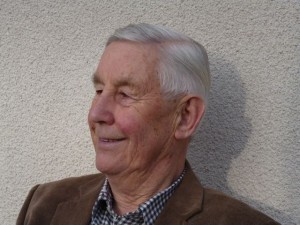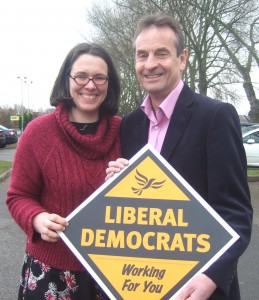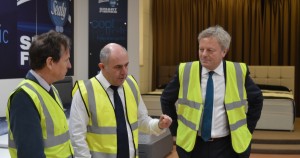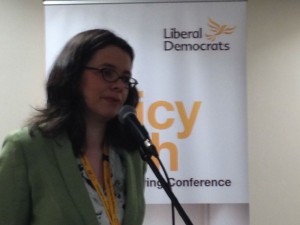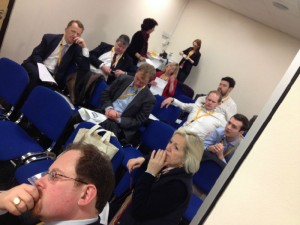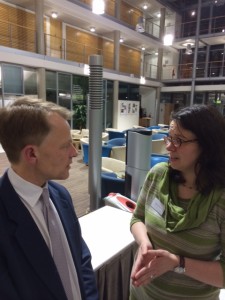It’s not too late to sign the online petition for a living wage in Cumbria. Please sign up now:
You are invited to a garden party
A strange compulsion
It was a bold innovation when this newspaper invited weekly contributions from members of the main political parties. I think these have all been of interest. Writers have not simply trotted out the political dogma of their own parties, but have reflected on what matters to them as individuals and what they personally consider important issues for our local community. Indeed I often find myself agreeing with the views of contributors from other parties.
What is it that drives people to become politically active; to support a particular political tribe?
Political involvement seems to many to be a strange, even bizarre way of spending one’s time. Politics is seen by some as corrupt or self-serving, and politicans are denigrated for incompetence or dishonesty.
Yet the truth is that political activity is an inevitable and necessary part of life; without it, our society would collapse into anarchy.
I myself fell into this world almost by chance. Frustrated by the dogmatism of Thatcherism and appalled by the antics of the ‘loony left’ I welcomed the emergence in 1988 of a new third force, with a belief in sensible, moderated market realism allied with a strong sense of social responsibility and a powerful green and internationalist ethic. I joined the Liberal Democrats and to my surprise soon found myself a parliamentary candidate both for Westminster and for Europe. From these experiences I learned some valuable lessons.
First, I discovered that the goals of most politicians are much the same. We aspire to similar ends, even if the means of achieving them differ. Unfortunately, our present system highlights the differences rather than the areas of agreement. Most politicians enter this much-disparaged field with ideals, to change society for the better. Perhaps if the Westminster parties could learn to work together wherever possible we might make more progress in doing so. The broadcast yah-boo nonsense of PM questions stands in stark contrast to the constructive work of the all-party select committees.
Secondly, every political party is a collection of individuals with differing ideas and priorities. These parties are not simply of one mind; they are ‘broad churches’ in which people have to listen to each other and to compromise. One of the special features of the Lib Dems is that policy-making is done in open discussion at conference or in special consultations. Members are actively encouraged to express their own ideas.
Thirdly, democracy, with individual entitlement to vote, remains the best system on offer, despite its imperfections. If you don’t believe this, if you are cynical about our political democracy and your ability to influence events, then show me a better system.
My own advice to people as we approach the election period is: take part; be heard; make your opinion count; and play an active, positive part in the political process. We will all be the losers if you do not!
Roger Putnam in the Whitehaven News. May 1st 2014
What has Chris Davies MEP done for West Cumbria?
Here’s just a quick insight into some of Chris’ work for West Cumbria in the last 18 months.
Chris Davies MEP in Cockermouth – November 2012
Chris Davies MEP with Rebecca Hanson, a West Cumbrian campaigner on education policy who he has supported and inspired.
In November 2012 Chris Davies MEP ran a major event on environmental issues in Cockermouth. Key people from many organisations with responsibility for our environment attended together with secondary school students from across West Cumbria.
Chris listened to local experts who told them about how they’d like environmental policy to develop in coming years. Chris’ work on reform to the fisheries policy was top of the agenda as it will impact positively on many local businesses.
Here is a link to a Times & Star picture of Chris chatting to Cockermouth School students taken at the event.
Chris Davies MEP in West Cumbria at the National Nuclear Laboratory: August 2013
Chris visited the National Nuclear Laboratory to better understand their needs, included their desire to be able to attend more European committees so they can take advantage of these expert knowledge bases. Chris and the Liberal Democrats support the next generation of Nuclear Power due to the substantial threat to climate change posed by the alternatives.
Chris Davies MEP with West Cumbrian Liberal Democrats and Directors at the National Nuclear Laboratory.
Chris Davies MEP in Keswick: November 2013
Chris accepted an invitation to meet students at Keswick School. The report by Heather Dempsey (a current Keswick School student who met Chris) can be found here.
Keswick mountain rescue have encouraged Chris to campaign for European tax laws to be reformed so that they are taxed as an emergency service. Chris’ campaign for this reform has recently been successful.
Chris also met with representatives of Sustainable Keswick.
Chris Davies MEP with Phill Roberts (Chair of West Cumbria Liberal Democrats) and Keswick Mountain Rescue
Chris Davies MEP in West Cumbria at Energus and Sealy Beds in West Cumbria: March 2014
Key people at Energus were concerned about the potentially damaging effects of Conservative proposals to change the funding of apprenticeships. They are now working with Liberal Democrat MPs to constructively challenge these reforms.
At Sealy Chris discussed the European policies which are helping the campaign against counterfeit goods which undermine reputable brands such as Sealy.
Chris Davies MEP with directors of Sealy UK.
Chris covers the whole of the North West of England. West Cumbria is just one third of one county. He works this hard everywhere. He also attends over 90% of sessions in the European Parliament.
Rebecca takes on the Dragons
Rebecca Hanson has reported that her journey into the ‘Dragon’s Den for Policy’ at the Liberal Democrats spring conference was “everything she hoped it would be”.
“I had 3 minutes to speak and then 7 minutes for intensive questions” said Hanson.
“To understand the policy it was essential the questions were intelligent and focused, which they were.”
“David Laws (Schools Minister) and Tim Farron MP (Liberal Democrats Party President) asked particularly challenging and important questions.”
Other dragons included Julian Huppert MP (front), Tessa Munt MP, Lorely Burt MP, Jeremy Brown MP and Simon Wright MP (PPS to Nick Clegg).
Hanson has been promised feedback soon but it seems the final contents of the 2015 manifesto won’t be revealed for a while yet.
Taking Ofsted into the Dragon’s Den
West Cumbrian Liberal Democrat Rebecca Hanson will be heading into the Dragon’s Den for policy at 07:35 this Saturday (8th March 2014) at the Liberal Democrat Spring Conference in York. She’ll be fighting to get her policy for reform to regulation in state education and healthcare into the 2015 manifesto. She’ll speak for three minutes and will then be subject to intensive questions and scrutiny. The text of the speech she’ll be making follows:
Dragon’s Den for Policy: Rebecca Hanson – Regulation in the State Sector – 8th March 2014
“Most of our modern regulators were set up rapidly in the 1980s and 1990s. By the time they’d been operating for a decade or so the strengths and weaknesses of each were apparent. Rather than trying to address the issues with each regulator individually, in 2005 the then government commissioned a holistic review of all regulation. Its findings went on to become the foundations of the regulators code of best practice.
I am proposing that we apply the standards for regulation defined in the regulators code, which are now well established in the private and charitable sectors, to the state sector and in particular to education, children services and healthcare.
This policy would prevent inappropriate political interference in the activity of our regulators. It end the use of special measures in cases where more targeted action would be sufficient. It would require regulators to clearly define what is and isn’t acceptable practice and the idea that ‘satisfactory is the new unsatisfactory’ would be consigned to the dustbin of history where studies on good practice in regulation show it belongs.
This policy, in its earlier forms, has the unanimous support of the northwest region and is also supported by the education association committee who have put it forward for consideration today. I’ve submitted it to federal conference and have received very positive feedback with the only reason given for it not going forward being that it wouldn’t generate controversy in debate as it was expected that all liberal democrats would support it. But this policy needs explicit support as it will not happen by accident. It will require the attention of a government over a parliamentary term. Although the relevant law was created in 2006 it wasn’t until the end of 2009 that most regulatory activity was subject to this legal framework as regulators needed time, consistent policy and coherent oversight to adapt their practice.
Unless there is coherent progress towards high quality and defensible regulation in the public sector the government will always be on the back foot when dealing with the justifiable complaints about the failings of Ofsted and the CQC, and we know from experience that ministers who do not have well grounded policy in place respond with powerful, knee-jerk actions which put more draconian and unaccountable power into the hands of people far from the front line.
This is exactly the kind of policy which clearly defines our identity as liberal democrats because it is an essential component of our desire to ensure that intelligent and responsible professionals all sectors of society are allowed the levels of professional freedom they need to function effectively.
Please support it both today and in the future.”
Rebecca Hanson explaining the policy for public sector reform to David Laws MP (Minister of State for Schools) at the National College for Teaching and Learning.
GDF Consultation Update
DECC have now published all the responses to the GDF consultation. These responses, together with a summary of them can be found at: https://www.gov.uk/government/consultations/geological-disposal-facility-siting-process-review
One Liberal Democrat has offered us this personal response:
Rock-Paper-Scissors?
Round and round it goes – one argument beating the other, beating the other.
The contentious argument of what to do with our nuclear waste divides us
like the rock blunts the scissors,
like the scissors cuts the paper,
like the paper wraps the rock.
What is the fascination with digging an enormous expensive“NIMBY” hole to put this stuff in?
It smacks of some crude out of sight and out of mind concept – it surely is ridiculous – or do we have some mining leviathan lurking in the deep waiting to fill their insatiable pockets?
Why go to such extraordinary lengths to find a “safe” place for nuclear waste when in fact the earth itself is something we can only guess at what it might do in the future – who’s future are they thinking about?
In 100 years – 1000 years – 10,000 years, it would be remiss of us to think that the force of the earth might not decide one day to unleash itself on the wretched void regardless of how many scientific papers our learned boffins churn out.
This notion is even more difficult to understand when we have one of the world’s best centres of excellence in concrete technology.
We can make concrete to whatever exacting standards we want.
We have the raw materials on our doorstep,
The technical expertise to design just what we need – there is no need to go mining???
A low level repository would do the job admirably and be manageable in the future for all generations, could be engineered in such a way that the earth could move and it could still be intact. Be managed in such a way that new technologies not yet appreciated could be implemented easily.
As undesirable as it is, is it actually an asset that we simply don’t know how to realise yet?
Roger Rivers
West Cumbria Liberal Democrats
Be careful what you wish for!
Roger Putnam (West Cumbria Liberal Democrats) in the Whitehaven News: Thurs 27 Feb 2014
GDF Consultation Response: December 2013
Copeland & Workington Liberal Democrats Response to the GDF Consultation Process
Given our previous opposition to the siting of a GDF in Cumbria based on sound geological, scientific and engineering advice we are pleased that the Government are entering into a National Consultation Process and are willing to learn from the experience of attempting to site a GDF on the West Coast of Cumbria.
We are concerned that the Review of the Siting Process for the GDF asks for a response to a number of leading open and closed questions however as a framework for gathering information and reflecting on past experience we are pleased to submit the following responses to the questions.
1. Do you agree that a test of public support should be taken before the representative authority loses the Right of Withdrawal? If so, what do you think would be the most appropriate means of making this test, and when should it take place? If you do not agree with the need for such a test, please explain why.
- We agree that a test of public support should be taken before the representative Authority loses its right to withdraw.
- We would advise against the GDF Process placing the decision making at a District Council level or in the gift of a relatively small easily influenced group within a community for example an Executive Body of a Council.
- We would encourage a much broader representative Steering Group to be developed that would include County District and Parish Councils plus community stakeholders.
- The body responsible for the disposal of all waste including Nuclear Waste (County Council or Unitary Authority) should retain this responsibility.
- The impact of a GDF would extend far beyond the boundaries of a single district council area. We are concerned that a district authority may not give due weight to important considerations relevant to a wider area.
2. Do you agree with the proposed amendments to decision making within the MRWS siting process? If not, how would you modify the proposed phased approach, or, alternatively, what different approach would you propose? Please explain your reasoning.
- We do not agree with the proposed amendments to the decision making within the GDF siting process.
- It is evident within the Consultation Document that the process is being manipulated to exclude and marginalise any Authority Community or Stakeholder that would provide challenge to the siting of a GDF in their area.
- The Right to Withdraw should be supported by legislation in order to provide confidence in the GDF Siting process.
- We would therefore suggest that to develop a partnership based on trust, with all the communities and stakeholders affected by the siting of a GDF, a public referendum should be undertaken following the collection and dissemination of all the geological scientific and engineering information available.
- The steering group defined in paragraph 2.53 needs to have a wider membership for it to be seen to be democratic and representative in areas where multi-tiered governance exists. County and borough council representatives should be included.
3. Do you agree with this approach to revising roles in the siting process set out in the White Paper? If not, what alternative approach would you propose and why?
- We do not agree with the approach to revising roles within the GDF siting process set out in the White Paper.
- It is essential that the process should be seen to be a truly National Process from the start and that all levels of Local Government should have an option to participate in the process Parish District and County/Unitary Authorities.
- The model of Voluntarism should be superseded by a presumption of Safety First at all times.
- We are of the opinion that a safety first evidence based model leading to voluntary engagement in the siting process would prove to be a national GDF Policy that communities and stakeholders could have confidence in.
4. Do you agree with this proposed approach to assessing geological suitability as part of the MRWS siting process? If not, what alternative approach would you propose and why?
- We would suggest that the initial reports provided by the RWMD during the Learning Phase should be restricted to the geological suitability of an area supported by sound scientific and engineering reports. An evidential process not undermined by socio-economic factors.
- It would support the GDF Siting process if more than one Local Authority or Community were engaged in the Learning Phase of the process so that Communities could see that all options were being considered within the process.
- The Cumbrian experience was that trust in the process broke down when it became apparent that the DECC/MRWS would not acknowledge the geological and scientific evidence that the Cumbrian geology would not be suitable for a GDF and that an engineering solution would not address these issues.
- A new independent body should be set up to advise all parties on the geological suitability of areas and the scientific and engineering requirements of siting a GDF.?
- All evidence should be peer reviewed to establish a safety first evidence based model that a community or stakeholder can have confidence in.
- West Cumbria Liberal Democrats support the view that a nationwide geological survey should be carried out.
5. Do you agree with this proposed approach to planning for a GDF? If not, what alternative approach would you propose and why?
- We would agree that the final Planning Decision for the siting of a GDF should ultimately be held at a National Level.
- We also agree that a specific National Policy Statement should be made setting out the Assessment Principles that would need to be met prior to the siting of a GDF.
- We support the proposal for the Appraisal of Sustainability and would also suggest that the proposal goes further and include all models and alternative suggestions for assessment.
6. Do you agree with this clarification of the inventory for geological disposal – and how this will be communicated with the volunteer host community? If not, what alternative approach would you propose and why?
- When considering the inventory for geological disposal we would suggest that the National Nuclear waste repository should be limited to safe storage of UK Nuclear waste and UK Nuclear Waste material processed.
- We welcome the UK Government DECC proposed changes to Baseline Inventory for Nuclear Waste.
7. Do you endorse the proposed approach on community benefits associated with a GDF? If not, what alternative approach would you propose and why?
- We would advise against complicating and ultimately undermining the evidence gathering process for the siting of a GDF by focusing too early in the process on the socio-economic support available to a host community. Communities should not be bribed to host a GDF.
- We would encourage the UK Government to establish funding for communities to participate in the Learning Phase (Engagement Funding).
- We would support funding for community benefit during the focusing Phase and the establishment of a Community Benefit Fund.
- The impact on the wider community geographically would be significant and this should be reflected in the disbursement of the Engagement Funding and Community Fund.
8. Do you agree with the proposed approach to addressing potential socio-economic and environmental effects that might come from hosting a GDF? If not, what alternative approach would you propose and why?
- We would suggest that any interested community would benefit from detailed environmental and socio-economic assessments.
- However this should commence during the Focusing Stage.
9. Do you have any other comments?
- We are pleased to note that the issue of retrievability has not been excluded from the process however we are of the opinion that a much clearer stronger statement regarding a positive commitment to retrievability should be made within the process.
- The formation of Steering Groups should have a clear membership and Terms of reference that have been shared with all communities and stakeholders.
- The Steering Group should therefore represent all levels within a community both elected and those who are not elected members of a proposed host community.
- West Cumbria Liberal Democrats welcome this government’s commitment to continuing with a fully democratic process and the substantial attempts which have been made to address lessons learned from previous failures. We particularly welcome the stated commitments to retrievability and to the process of independent peer review.
- The process of independent peer review recommended in this report should be transparent and it should be extended into the public domain, with resource being provided to properly answer question in real time through mass online discussion.
- However in addition to points already raised, a significant failing of this report is that it fails to present the scientific case for a GDF and is based on the assumption that this case is made. The UK Government must understand that it is unlikely to win any public test of support when it fails to properly engage with the concerns of members of the public who agree with Scottish policy and do not believe that the case for geological disposal is made.
- In Cumbria opposition to the GDF was successful because it was perceived by open minded members that by 2013 the case being made for a GDF was not convincing. It was perceived that if the UK government was not concerned to scrutinise or properly present this case it would be unlikely to take the appropriate level of care with its consideration of where to site a GDF.These concerns were compounded by our members’ experiences of previous decisions made regarding investment at Sellafield which took place despite locally known issues which should have been addressed and which led to vast waste.?
- Enhancing the process of independent peer review in the ways described above would be likely to play an important part in the process of convincing key leading analysts and communities should the evidence justify proceeding.
Yours sincerely
Phill Roberts (Chair, Copeland & Workington Liberal Democrat Party)
- « Previous
- 1
- …
- 5
- 6
- 7


